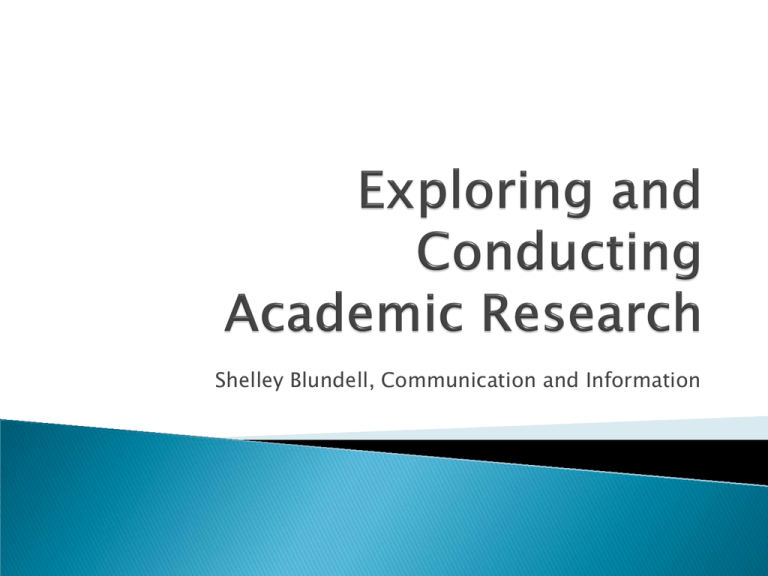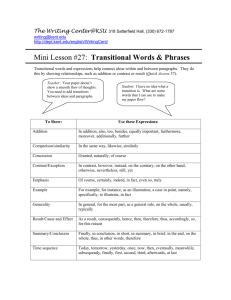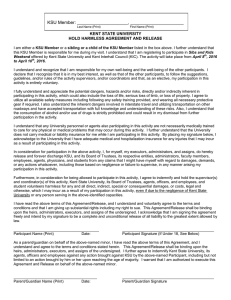Shelley Blundell, Communication and Information
advertisement

Shelley Blundell, Communication and Information Today’s session will discuss Academic research at the graduate level, How to begin a research endeavor, Formulating a research idea, Efficient and effective academic reading, and Where to turn for assistance/advice/resources. Expected within (and to be a part of) ‘the academy.’ Academic research strengthens your argument. Academic research = assessment of what has been done. Professors, advisors, and librarians – all great resources. Google – improved dramatically. Boolean operators, etc. (handout) return better results. Google Scholar – a great resource but … why pay when you can get the work for free? What is the Kent State VPN, and how can it help me? Advisors are typically assigned based on your research interests, therefore can aid you in developing your research ideas/projects during your program of study. Many advisors are considered authorities in their fields. Seek out advisors during office hours, or schedule appointments or ‘virtual sessions’ regularly. Other professors in your discipline are great resources, too. Meet with a subject librarian in your field regularly. Establishing a regular meeting schedule/association with your subject librarian may open many research doors. Consider the Kent State University Libraries tutorials for additional assistance with your research action plan. Identify your information need/topic (assigned vs. selected). Refine the topic on which you want to find research. Put together an action plan for your research. If you’re unclear, consult professors/advisor/librarians. Research action plan (also known as a research strategy): ◦ Identify key words and phrases regarding your topic. ◦ Perform preliminary searches using these words and phrases in research databases in your field. ◦ Assess content returned – does it match your needs? Why/why not? ◦ If necessary, refine words and phrases as you continue to do research. ◦ Check references of good results for more resources. ◦ If you get stuck, librarians can help you refine your strategy. What is a reliable and/or an authoritative source? ◦ Written/created by professionals in the field. ◦ Has date published/created detail. ◦ From professional journals/books/sites. ◦ Reviewed highly by others (in the field or outside). Other ways to judge reliability/authority: ◦ Journals/books/materials in your field that have transparent practices and high publication standards. ◦ Journals/books/materials in your field recommended by professors/advisors/librarians. It is good to refer to current materials in the field, but don’t forget the role of pioneer works in your research. If one or two journals in your field regularly provide useful and worthwhile information, consult these regularly. Time used efficiently is time saved. Academic resources – ‘exhaustive’ can be overwhelming, but decide on your resources wisely. Tips for decision-making: ◦ ◦ ◦ ◦ Find ways to limit your search results efficiently (handout). Become a self-filterer – which results are MOST related to your topic? Assess authority/credibility/reliability/currency of materials. Ask “who cites who?” Three most useful and valuable parts of a journal article. ◦ Abstract: General overview of the article. ◦ Introduction: Why should I care? ◦ Conclusion: Key findings and results. Three elements should display ‘usefulness’ of article. While reading: ◦ Take notes. ◦ Highlight major points. ◦ React to what you read. ◦ Construct your own example. ◦ Summarize what you have read in three to five sentences. Pro tip: Copy key quotes (WITH CITATION) into a separate document – will help you formulate and synthesize argument Books – check out book reviews (many are accessible through scholarly databases and are more reliable than Amazon, etc.). Online resources – check references, use Google Scholar to see how many times the work has been cited and how. When in doubt, ask a librarian! MLA, APA and ASA – three common styles ◦ Writing Commons will provide further assistance Purdue OWL for late night assistance Writing Commons: 4th floor library ◦ Biweekly graduate writing workshop – Friday, Oct. 18, 1 to 2 p.m. Kent State’s policy on academic honesty does not discuss INTENT - accidental plagiarism is still plagiarism. Academic honesty protects you and your work as well. Best practice: Refer back to notes taken while reading to see if something ‘you’ said is someone else’s work. Proactive citation is always key in academic writing/research. KSU Library homepage: http://www.kent.edu/library/index.cfm KSU Library skill modules: http://libguides.library.kent.edu/tutorials KSU library VPN information: http://www.kent.edu/library/services/offcampus.cfm KSU Academic Honesty Policy: http://www.kent.edu/policyreg/policydetails.cfm?customel_d atapageid_1976529=2037779

